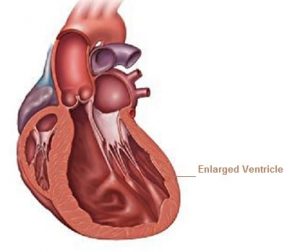Hypertrophic Cardiomyopathy
Hypertrophic Cardiomyopathy
It is defined as the condition in which your cardiac muscles become hardened and thick due to hypertrophy of cardiac cells which make heart unable to perform their normal function. Sometimes it remains undiagnosed but, in some patient, it may produce severe signs and symptoms due to which treatment must require to correct this condition.
Symptoms
Signs and symptoms of hypertrophic cardiomyopathy include:
- Chest pain on exertion
- Fainting
- Dizziness
- Heart murmurs
- Palpitations
- Breathing difficulty
Causes
The main cause of hypertrophic cardiomyopathy is mutation which causes the error in DNA of cardiac muscles due to hypertrophy occur in myocytes beyond the limit. In hypertrophied heart there is also a myofiber disarray which means abnormal arrangement of heart muscles cells.
Complications
Complications from hypertrophic cardiomyopathy include:
- Stroke
- Heart failure
- Coma
- Atrial fibrillation
- Arrhythmia
- Dilated cardiomyopathy
- Obstruction in blood flow
Diagnosis
After taking your medical history and perform a precordial examination your doctor might recommend the following test to confirm the diagnosis:
- Chest Xray. To see the condition of heart and lungs
- To evaluate the pumping ability of your heart
- To check the electrical activity of the heart
- CT scan. This will provide the better image of the heart
Treatment
The aim of treatment is to reduce the signs and symptoms and prevent the life-threatening complications. Treatment options include:
Medications
In hypertrophic cardiomyopathy medication used to slow the rate of heart beat so that more blood pumped during each beat. Medicines include:
- Beta blocker
- Anti-arrhythmic like amiodarone
- Blood thinner to prevent blood clotting like warfarin and heparin.
Surgical options include septal ablation, septal myectomy, and cardioverter-defibrillator to prevent the complications.
Lifestyle and Home Remedies
Along with right treatment, better lifestyles will provide you better results:
- Reduce sodium in diet
- Stop smoking
- Avoid alcohol
- Eat a healthy diet
- Exercise daily
- Maintain a healthy weight
- Take proper sleep
- Avoid stress
- Control blood pressure
